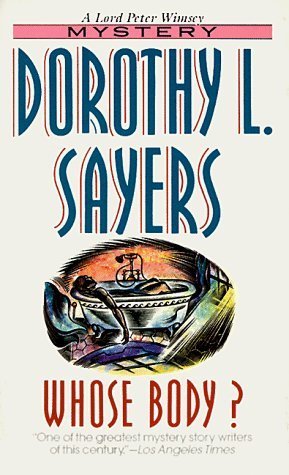
I like my detective stories like I like my eggs: hard-boiled. (This is a lie, I actually hate eggs, but for the purposes of a punchy opening pun, I like my eggs like I like my detective stories (hard-boiled, in case you missed it).) So it made perfect sense for me to include a few detective stories on my Quest of 100 Books (films rights available). And what better place to start than in the golden age of the detective story with one of its most celebrated female authors, Dorothy L. Sayers?
Whose Body? is at one and the same time a meticulously-plotted mystery novel and also something of a pastiche of the same. It features Lord Peter Wimsey (whose name should give an indication of the novel’s tone) who has weaned himself on Sherlock Holmes stories and, with too much time and money on his hands, rather fancies himself as following poshly in his footsteps. This is to the well-wearied consternation of his butler, Bunter, who's sick of waiting up to all hours of the night waiting to clean his master's muddy boots when he deigns to get home.
The relationship between Wimsey and Bunter is ripe for all sorts of amusing reflections on class. Both characters clearly owe something to PG Wodehouse, but they and Sayers’ tone are distinct in their own rights. A fun example:
’But you don’t think the fellow who left that chain on the body is going to give himself away by coming here and inquiring about it?’
‘I don’t, fathead,’ said Lord Peter, with the easy politeness of the real aristocracy.
There’s also quite a bit of, if not actually breaking the fourth wall, certainly impolite elbowings of it, as Sayers dissects the mystery novel structure, even as she is in the act of contributing to its definition. For example, shortly after another character has deftly summarised a witness’ report:
’And in short stories,’ said Lord Peter, ‘it has to be put in statement form, because the real conversation would be so long and twaddly and tedious, and nobody would have the patience to read it. Writers have to consider their readers, if any, y’see?’
Even in this time, the way that the mystery / detective novel was structured was still being toyed with, and it shows. For instance, for a modern reader it’s pretty clearly within the first quarter of the book whodunnit, and we’re just kept guessing as to how and why. That doesn’t impair the reading of the book – the solution is elegant and the patchwork intricate, so it’s a pleasure to see it unfold. But it does mean that the book stands as an interesting artefact in the evolution of the form.
Overall, while it’s not hard-boiled (the upper-class niceties of early 1900s English etiquette not allowing for it) it’s not quite soft-boiled either, and it is a heck of a pleasure to read.
--
This is my twenty-first book review of 100 to raise money for Refuge, the domestic abuse charity. If you liked this review, or just want to help out, please donate on the link below!
Comments
Post a Comment